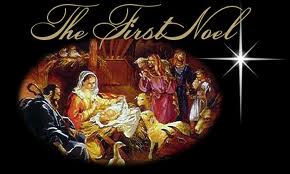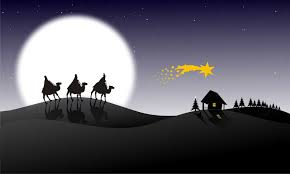Notes on the Notes – December 30, 2018
First Sunday after Christmas
This week’s scripture reading:
Luke 2:39-52
This week’s music:
“The First Nowell” (VU #91)
“The first Nowell the angel did say was to certain poor shepherds in fields as they lay; in fields where they lay a-keeping their sheep on a cold winter’s night that was so deep.  Nowell, Nowell, born is the King of Israel.
Nowell, Nowell, born is the King of Israel.
They looked up and saw a star, shining in the east, beyond them far; and to the earth it gave great light, and so it continued both day and night.
And by the light of that same star three wise men came from country far; to seek for a king was their intent, and to follow the star wherever it went.
This star drew nigh to the northwest; o’er Bethlehem it took its rest, and there it did both stop and stay, right over the place where Jesus lay.
Then entered in those wise men three, full reverently upon their knee, and offered there in his presence their gold and myrrh and frankincense.
Then let us all with one accord sing praises to our heavenly Lord, that hath made heaven and earth of nought, and with his blood our life hath bought.
Nowell, Nowell, born is the King of Israel.”
Since medieval times, telling the story of the birth of Christ in song has been an important tradition, especially in the Western Church. Since congregational participation, including singing, was very limited in the medieval Catholic Mass, the people’s song developed outside the church. In most cases, the composers of these carols have long been lost in time, partly a function of their oral tradition. Undoubtedly, carols existed in oral forms long before being published in collections.
“What does ‘noel’ mean?” “Nowell,” the English transliteration, comes from the old French “nouel,” which is now written in modern French as “noël.” The derivation of this word probably comes from the earlier Latin term “natalis,” relating to a birth. In Latin, “dies natalis” means “birthday.” Some suggest that “noel” is also related to “novellare” or “nouvelle” meaning “new” – something to tell. The earliest use of the word “nowel” in literature is in Chaucer’s Canterbury Tales (c. 1395). In modern times, the words “nowel” and “noel” are used interchangeably to mean “Christmas.”
“The First Noel” probably extends back to the 17th century in its oral form, but it was published first in Some Ancient Christmas Carols in 1823. It appeared originally in nine stanzas, five of which are common in most hymnals. Though the angels’ appearance to the shepherds (Luke 2:1-20) is the subject of the first stanza, most of the carol focuses on the journey of the Magi (Matthew 2:1-12), giving an overall feeling of Epiphany.
The tune, a traditional West Country melody, may be a fragment of an older English carol melody. Sir John Stainer (1840-1901) standardized the melody as we know it and provided a harmonization that has become the customary one today.
The repeated “Noel” (or “Nowell” in some hymnals) has the character of spreading the good news – “born is the King of Israel.” The final stanza in Voices United draws all humanity into the story and extends the salvation narrative to Christ’s suffering. This closing verse places the birth of Jesus into the fuller context of redemption.
Hear Lady Antebellum at: http://www.youtube.com/watch?v=dVtNXp56kiQ
Hear Nat King Cole at: https://www.youtube.com/watch?v=E0S7yz2jTq0
Hear Natalie Cole at: https://www.youtube.com/watch?v=rf6fTRTQrG4
“Joy is Now in Every Place” (VU #45)
“Joy is now in every place,
Christmas lightens every face;
Now be with us, in your grace,
O hear us, bless us, holy Jesus.
May the star that shone that night,
Making your poor stable bright,
Fill our hearts with love and light,
O hear us, bless us, holy Jesus.
Through the New Year let it stay,
Leading us upon your way,
Making Christmas every day,
O hear us, bless us, holy Jesus.
Now and ever may we find
Your good news to fill our mind:
Peace and love to humankind,
O hear us, bless us, holy Jesus.”
According to the Canadian Youth Hymnal (1939), the source of this carol was Child Education, December 1929, although the author of the words is unknown. The German carol tune has been in use since the 1500s, when it was used in medieval mystery plays about the nativity. It is the tune for the German carol “Joseph lieber, Joseph mein.”
“When a Star is Shining” (VU #97)
“When a Star is shining over eastern hills,
When the air is silent, and the clamour stills,
When the night is waiting, and the old hopes rise,
Then the time has ripened and the heart grows wise.
Where the world is waiting for an unknown day,
Where a voice forgotten cries, “Prepare the way!”
Where an earthly power makes the heart turn cold,
There the gifts are offered: incense, myrrh and gold.
Lead us on, O Daystar, in the the quiet night;
Guide us through the shadow with your gentle light;
Show us in a manger our redemption’s sign;
Bring us to a morning where the promise shines.”
Sylvia Dunstan, a United Church minister and hymn writer, wrote this hymn for the annual Epiphany service at Emmanuel College and St. Andrew’s United Church in Toronto. The lyrics reference both John the Baptist and the three Kings from the east, as well as sharing the longing for a more peaceful, gentle world. The tune, KING’S WESTON, was composed by Ralph Vaughan Williams as a setting of “At the name of Jesus” in 1925.
Hear the melody on hand bells at: https://youtu.be/Y-xqwN6CSys
“What Can I Give Him” (VU #55 v. 4)
“What can I give him, poor as I am?
If I were a shepherd, I would bring a lamb,
If I were a wise man, I would do my part,
Yet what I can I give him – give my heart.”
We will be using the fourth verse of the carol “In the Bleak Mid-Winter” as our offering response. Christina Rossetti’s verse places the singer at the manger, with the reminder to give the most valuable gift of all – “give my heart.”
“Go, Tell it on the Mountain” (VU #43)
“Go, tell it on the mountain, over the hills and everywhere.
Go, tell it on the mountain that Jesus Christ is born.
While shepherds kept their watching o’er silent flocks by night,
Behold, throughout the heavens there shone a holy light…
The shepherds feared and trembled when lo, above the earth
Rang out the angel chorus that hailed our Saviour’s birth!…
Down in a lonely manger the humble Christ was born,
And God sent our salvation that blessed Christmas morn…”
Due to music being passed in the oral tradition by southern slaves, the author of this song remains unknown. The song was known to have been sung by African American slaves since as far back as at least 1865.
See Dolly Parton sing the carol in her classic Christmas special at: https://www.youtube.com/watch?feature=player_embedded&v=3nPFUh4j2OM
Sing along with Starfield at: https://www.youtube.com/watch?v=yGs0mJco9lk&feature=player_detailpage
“O Light of Nations” (VU #84 v. 4)
“O Light of Nations, fill the earth; our faith and hope and love renew.
Come, lead the peoples to your peace, as stars once led the way to you.”
Ruth Duck has written a text fitting for the season of Epiphany, with its sense of wonder at the incarnation and its petition that through Christ’s revelation that our lives may be changed. The words were written in 1991. We will be using the fourth verse of the hymn as our Benediction response. CANONBURY is one of a number of 19th-century hymn tunes adapted from instrumental works by well-known composers. The melody is from Robert Schumann’s Nachtstucke, Opus 23, No. 4 (1839) for solo piano (http://www.youtube.com/watch?v=_88SiwtWzc8 ).



You must be logged in to post a comment.